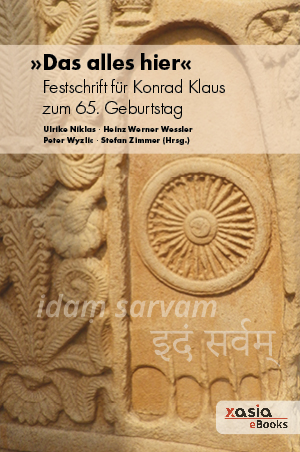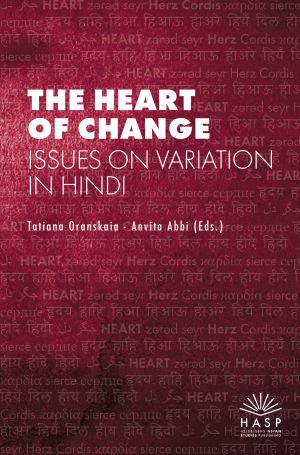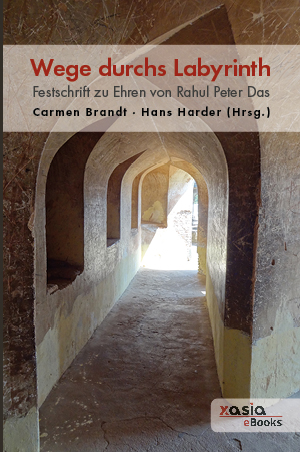Wessler , Heinz Werner
»Das alles hier«: Festschrift für Konrad Klaus zum 65. Geburtstag
»Das Weltall, die Gesamtheit des in der Welt Vorhandenen, wird in den Brāhmaṇas gewöhnlich mit dem Ausdruck idaṃ sarvam ›das alles hier‹ bezeichnet…«, reads Konrad Klaus' doctoral thesis Die altindische Kosmologie (1986). The completion of his 65th year – at the same time the completion of two decades as a university professor in Bonn – is a welcome occasion for us to honour Konrad Klaus with this Festschrift. »Das alles hier« may gladly also be interpreted in terms of the honoree's life's work to date: A rich academic work with multiple activities in teaching, research and science management with a large number of brilliant publications on philological and cultural-historical issues as visible signs. Konrad Klaus has a worthy place in the scholarly tradition of Indology, which began in Germany with the establishment of the first chair dedicated to Indian philology at the newly founded University of Bonn in 1818. It would be mistaken to think that the 200th anniversary in 2018 was a kind of early funeral. The transition to South Asian Studies with a renewed profile is part of the life's work of Konrad Klaus, who, although himself a classical Indologist, fully supported and benevolently accompanied this reorientation.
The Heart of Change - Issues on Variation in Hindi
The present volume, which comprises seven English contributions and four in Hindi, addresses issues of linguistic variation – a phenomenon central to the study of language use – in regard to the major official language of India. It combines multiple theoretical and pragmatic approaches to a variety of linguistic phenomena conceptualised under the designation 'Hindi’ and attempts to obtain a more accurate portrayal of the changing reality behind this versatile taxonomic term. In doing so, this volume provides insight into how the forms and functions of Hindi are changing across borders within and outside of India; the concept of language contact is thus present in several of the studies. The analyses are based upon data observed in written texts, including manuscripts, and elicited from instances of oral speech.
The contributions, prepared by established and emerging scholars from several Asian and European countries, investigate functional aspects of the regional, social, and cultural forms of Hindi and how they interact in differing contexts, time periods, and types of communication. A similar vantage point is being adopted in the investigation of possibilities and constraints of formal variation in the grammatical structures of Standard Hindi. In addition to providing analyses from the perspectives of both general linguistics and sociolinguistics, the book discusses issues associated with teaching Hindi from the perspective of language variation.
The volume is distinguished by its innovative character in terms of both the data utilized in it and the width of its scope, and aims to contribute to a better understanding of ‘Hindi’ as a concept as well as of the general principles of linguistic variation.
Wege durchs Labyrinth: Festschrift zu Ehren von Rahul Peter Das
Wege durchs Labyrinth is a commemorative volume in honor of Professor Dr. Rahul Peter Das. It contains contributions in German and English by colleagues, students and fellow scholars of Professor Das. The essays collected here represent various thematic areas that Professor Das has also worked on in his extensive scientific oeuvre. These include Sanskrit studies, historical linguistics, text editions in New Indo-Aryan languages, sociolinguistics, South Asian religious history, Bengali and Hindi literature, history of science in Indology/South Asian studies, and also Tamil studies. Some of the contributions link directly to Rahul Peter Das' work or particular writings, while the totality of the essays reflect his various research interests and different methodological approaches.
Contributors to this Festschrift are Carmen Brandt, Renata Czekalska, Ines Fornell, Eli Franco, Ratul Ghosh, Olav Hackstein, Hans Harder, Martin Kämpchen, Klaus Karttunen, Makoto Kitada, Frank J. Korom, Agnieszka Kuczkiewicz-Fras, Halina Marlewicz, Ulrike Niklas, Tatiana Oranskaia, Felix Otter, Adapa Satyanarayana, Britta Schulze-Thulin, Sabine Franziska Strich, Heinz Werner Wessler and Benjamin Zachariah.










